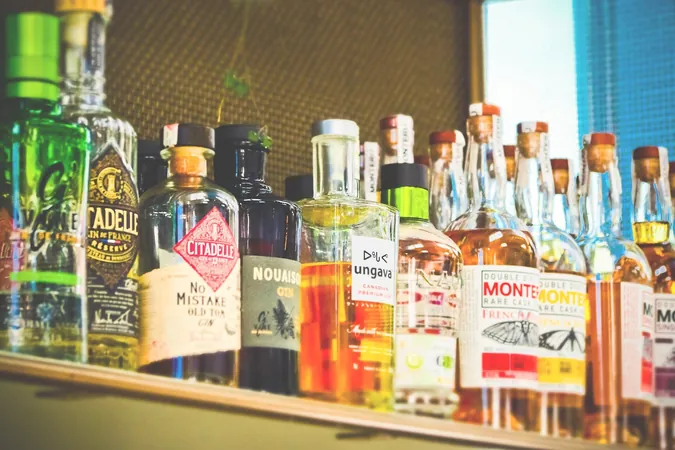
Will Calorie Labels on Alcohol Transform Drinking Habits? New Study Reveals Shocking Insights!
2024-09-18
Introduction
A recent study conducted by UCL researchers has unveiled interesting revelations about heavy drinkers in England. Remarkably, over half of these individuals believe that the introduction of calorie labels on alcoholic beverages could prompt a shift in their drinking habits, suggesting that this simple change might help many manage their weight better.
Study Overview
Published in the esteemed journal BMJ Open, this comprehensive study analyzed survey responses from 4,683 adults across England to understand how calorie labeling on alcohol could potentially influence consumer behavior. The results showed that 54% of heavy drinkers—classified as "hazardous drinkers" based on a tailored questionnaire—expressed willingness to modify their drinking habits if calorie labels were made mandatory. In comparison, only 44% of lighter drinkers shared the same sentiment.
Behavioral Changes
When delving into specific behavioral changes, the survey findings were quite telling: 27% of heavy drinkers indicated they would opt for lower-calorie options, while 18% mentioned they would consume alcohol less frequently, and 17% said they would reduce the number of drinks they consume.
Awareness of Calorie Counts
Interestingly, the research also assessed participants' awareness of calorie counts within various types of alcohol. The results revealed that hazardous drinkers were more adept at accurately estimating the calories present in popular alcoholic beverages like beer, wine, and spirits, compared to their low-risk and non-drinking counterparts.
Expert Insights
Lead researcher, Professor Andrew Steptoe from UCL Behavioural Science & Health, noted, "Our findings highlight that a significant number of heavier drinkers are open to changing their drinking habits with the introduction of calorie labeling. This points to the potential of labeling in targeting higher-risk drinkers who might be consuming excessive calories from alcoholic beverages, contributing to weight gain."
Current Regulations
Currently, UK law mandates nutritional labeling for all food and non-alcoholic drinks; however, alcoholic drinks are exempt from this requirement, only needing to display alcohol content, volume, and any allergens.
Survey Highlights
The survey was conducted using a representative sample from November 2022 to January 2023. Grouping respondents into categories based on their drinking habits revealed that around three-quarters were low-risk drinkers, with hazardous drinkers comprising about one-quarter of the sample.
An overwhelming 58% of the respondents stated that calorie labeling would be beneficial. A striking 64% believed it should be displayed in retail locations, while 52% felt the same for pubs, bars, and restaurants, although drinking respondents were less enthusiastic compared to non-drinkers.
Accuracy in Calorie Estimation
The study also tested participants' accuracy in guessing calorie counts for various alcoholic drinks and found that hazardous drinkers consistently outperformed their peers in accuracy. However, incorrectly, they tended to overestimate calorie content rather than underestimate it.
Conclusions by Researchers
The researchers concluded that raising public awareness about the calories in alcoholic beverages may not be as effective for reducing consumption as altering attitudes toward drinking. Hazardous drinkers, in particular, might inadvertently consume more if they are only informed about calorie content.
Co-author Professor Jamie Brown emphasized, "While these findings are promising, calorie labeling alone is unlikely to make a significant impact on the UK's strategy to tackle alcohol-related harms and obesity. It should complement broader measures including advertising restrictions, availability limitations, taxation, and pricing strategies."
Recommendations
Furthermore, the researchers emphasized the importance of increasing the availability of low-calorie options, which appeared to be the most favorable course of action in response to mandatory labeling, particularly appealing to hazardous drinkers.
Future Implications
As conversations about health and alcohol consumption grow increasingly relevant, this study could herald a significant change in how we approach drinking. The ripple effects of calorie labeling on alcohol could reshape drinking culture and contribute to healthier choices among consumers.




 Brasil (PT)
Brasil (PT)
 Canada (EN)
Canada (EN)
 Chile (ES)
Chile (ES)
 España (ES)
España (ES)
 France (FR)
France (FR)
 Hong Kong (EN)
Hong Kong (EN)
 Italia (IT)
Italia (IT)
 日本 (JA)
日本 (JA)
 Magyarország (HU)
Magyarország (HU)
 Norge (NO)
Norge (NO)
 Polska (PL)
Polska (PL)
 Schweiz (DE)
Schweiz (DE)
 Singapore (EN)
Singapore (EN)
 Sverige (SV)
Sverige (SV)
 Suomi (FI)
Suomi (FI)
 Türkiye (TR)
Türkiye (TR)